
EDUCATION FOR INFORMATION
Scope & Guideline
Advancing Knowledge in Education and Information Science
Introduction
Aims and Scopes
- Library and Information Science Education:
The journal focuses on the development and evaluation of educational programs in library and information science, including competency frameworks, curriculum design, and pedagogical strategies. - Social Justice and Equity in Information Access:
A consistent theme in the journal is the examination of social justice issues within LIS, including racial equity, ableism, and the role of libraries in supporting diverse communities. - Impact of Technology on Information Practices:
The journal explores the implications of emerging technologies such as artificial intelligence, digital scholarship, and online learning environments on information management and library practices. - Research Methodologies in LIS:
There is a strong emphasis on the application of diverse research methodologies, including qualitative, quantitative, and mixed methods approaches, to address complex problems within the information sciences. - Civic Engagement and Community Roles of Libraries:
The journal highlights the evolving roles of libraries in community engagement and social responsibility, particularly in combating misinformation and promoting civic literacy.
Trending and Emerging
- Artificial Intelligence and Ethics:
There is a growing focus on the ethical implications of artificial intelligence in information practice, highlighting the need for fairness and accountability in AI systems used within libraries and information services. - Experiences of Marginalized Groups in LIS:
Recent publications increasingly center on the experiences of disabled, neurodiverse, and BIPOC individuals within library and information science, addressing systemic inequities and advocating for inclusive practices. - Digital Scholarship and Open Science:
The evolution of digital scholarship and open science practices is a trending topic, with discussions on the barriers and opportunities for academic libraries to support these initiatives. - Mental Health and Well-Being in Education:
Emerging themes related to mental health and well-being, particularly in the context of academic pressures and the COVID-19 pandemic, are becoming more prominent in LIS research. - Information Literacy in Diverse Contexts:
The journal is witnessing an increasing interest in information literacy across various disciplines and communities, emphasizing the need for tailored approaches to information education.
Declining or Waning
- Traditional Library Services and Operations:
There has been a noticeable decrease in publications focusing solely on traditional library operations, such as cataloging and circulation, as the field shifts towards more dynamic roles involving technology and community engagement. - Archival Studies in Isolation:
Although archival studies remain important, the focus on isolated archival practices without consideration of broader social or technological contexts appears to be waning, as the field increasingly emphasizes intersectionality and community involvement. - Conventional Research Metrics:
Research that relies heavily on traditional bibliometric indicators and impact factors is declining, as the community seeks to explore more nuanced measures of scholarly impact and relevance. - Lone Research Perspectives:
There is a reduced emphasis on individualistic research perspectives, with a growing trend towards collaborative and interdisciplinary approaches that integrate multiple viewpoints.
Similar Journals

Ibersid-Revista de Sistemas de Informacion y Documentacion
Shaping the Future of Information Systems ResearchIbersid-Revista de Sistemas de Informacion y Documentacion is an esteemed academic journal published by IBERSID NETWORK, focusing on pivotal themes in the fields of communication, computer networks, information systems, and library and information sciences. With an ISSN of 1888-0967 and an E-ISSN of 2174-081X, this Spanish journal has been a significant contributor to scholarly discourse since its inception in 2012. Recognized in the 2023 category quartiles, it holds a Q3 ranking in communication and library and information sciences, while ranking Q4 in computer networks and communications as well as information systems, reflecting its unique intersectionality within these domains. Despite its emerging status, evidenced by its Scopus ranks demonstrating a mixed percentile across various categories, the journal is committed to advancing knowledge and fostering innovative research. Researchers, professionals, and students are encouraged to contribute to this open-access platform, further enhancing the impact and reach of vital information and documentation systems.
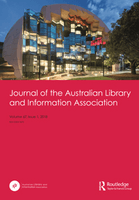
Journal of the Australian Library and Information Association
Connecting scholars to the forefront of information research.Journal of the Australian Library and Information Association (ISSN: 2475-0158, E-ISSN: 2475-0166) is a vital academic resource published by Routledge Journals, Taylor & Francis Ltd, based in the United Kingdom. This esteemed journal serves the field of Library and Information Sciences, having achieved a notable Q2 ranking in the 2023 category quartiles and a position of 74 out of 280 in Scopus ranks, placing it within the 73rd percentile nationally. With an open access model, it facilitates widespread dissemination of knowledge, thereby enhancing the visibility and impact of research within the library and information domain. Spanning a convergence of years from 2017 to 2024, the journal aims to promote innovative research, best practices, and critical discourse that address contemporary challenges in library and information services. It provides a platform for researchers, professionals, and students to engage with leading-edge scholarship, ensuring the continuous advancement of the field and fostering a community committed to excellence in information stewardship.

African Journal of Library Archives and Information Science
Connecting Scholars, Inspiring Solutions.The African Journal of Library Archives and Information Science (ISSN: 0795-4778; E-ISSN: 0795-4778) is a pivotal publication in the field of Library and Information Sciences, published by ARCHLIB & INFORMATION SERVICES LTD in Nigeria. With a focus on the diverse and evolving challenges faced by libraries and information professionals in the African context, this journal serves as a platform for scholarly communication, fostering innovation and collaboration among researchers, practitioners, and academics. The journal has a notable impact factor, reflected in its Q3 ranking within the category for 2023, and is indexed in Scopus, holding a percentile rank of 22nd in its field, further validating its relevance and scholarly contribution. Running since 2008 with continual publications through to 2024, the journal aims to advance knowledge, share best practices, and highlight emerging trends in librarianship and information science across Africa and beyond. By offering open access options, it ensures wide dissemination of knowledge, making it an essential resource for those dedicated to enhancing information services and archives.
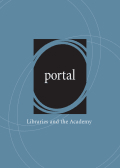
PORTAL-LIBRARIES AND THE ACADEMY
Advancing Knowledge at the Intersection of Information and EducationPORTAL: Libraries and the Academy is an esteemed academic journal published by Johns Hopkins University Press, focusing on the intersection of library and information science, academic practice, and scholarly communication. With an ISSN of 1531-2542 and an E-ISSN of 1530-7131, this journal offers rigorous peer-reviewed research essential for librarians, researchers, and information professionals committed to enhancing academic libraries and fostering innovative practices in higher education. It holds a strong position in its field, ranking in the 61st percentile within Social Sciences and Library and Information Sciences, and categorized as Q2 in both Development and Library and Information Sciences for 2023. Though the journal is not Open Access, its content is invaluable for anyone interested in staying abreast of the latest trends and challenges in library services and academic environments. Since its inception in 2001, PORTAL has continuously contributed to the discourse on the evolving role of libraries in academia, making it a critical resource for those striving to bridge the gap between information access and higher education pedagogy.

South African Journal of Libraries and Information Science
Championing best practices in South African library science.South African Journal of Libraries and Information Science, published by FORUM PRESS, is a premier open-access journal dedicated to advancing knowledge and research in the realms of library science and information management. Since its inception, this journal has been pivotal in promoting scholarly discourse amongst librarians, information professionals, and researchers within South Africa and beyond. With its open-access model implemented in 2011, it provides an invaluable platform for the dissemination of research findings, encouraging accessibility and collaboration within the field. The journal features a diverse range of articles that explore contemporary issues, innovations, and best practices in libraries and information science, making it essential reading for those seeking to stay at the forefront of this dynamic discipline. By fostering open dialogue and knowledge sharing, the South African Journal of Libraries and Information Science plays a critical role in shaping the future of library and information science education and practice.
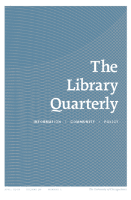
LIBRARY QUARTERLY
Championing Excellence in Library ScholarshipLIBRARY QUARTERLY, published by University of Chicago Press, stands as a premier academic journal in the field of Library and Information Sciences. With an ISSN of 0024-2519 and an E-ISSN of 1549-652X, this journal has been a vital source of scholarship since its inception in 1946. Positioned in the Q1 category for its field, it ranks #79 out of 280 in Scopus, reflecting its significant influence and quality as recognized by the academic community. Although it does not offer open access, LIBRARY QUARTERLY provides an indispensable platform for research and discourse on library practices, information management, and related technologies. Its scope encompasses a wide range of topics pertinent to both traditional and emerging issues within libraries, serving as an essential resource for researchers, professionals, and students alike. By engaging with this journal, readers gain access to cutting-edge research that shapes the future of library science and inspires innovative practices within the field.
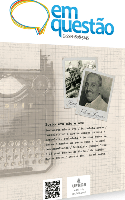
Em Questao
Exploring Innovative Trends in Library and Communication StudiesEm Questao is an esteemed open-access journal dedicated to the fields of library science and communication studies, published by the Universidade Federal do Rio Grande do Sul, specifically through its esteemed Faculdade de Biblioteconomia e Comunicação. Since its inception in 2003, this journal has provided a platform for researchers, professionals, and students to disseminate influential scholarly work that fosters dialogue and innovation within these critical academic domains. Em Questao strives to enhance the visibility of emerging trends and methodologies in library science and communication, making it an indispensable resource for those looking to navigate the complexities of information dissemination in today's digital landscape. With a commitment to open access, it ensures that knowledge is readily available to a global audience, contributing to the advancement of these vital fields. Researchers interested in exploring insightful analyses and fostering collaborative research will find Em Questao a valuable addition to their academic resources.

LAW LIBRARY JOURNAL
Exploring the future of legal information management.Law Library Journal, published by the American Association of Law Libraries, serves as a pivotal resource for academics, practitioners, and students in the fields of law and library science. With an ISSN of 0023-9283 and an e-ISSN of 0023-9283, this esteemed journal examines the dynamic interplay between legal scholarship and library practices, ultimately contributing to the enhancement of legal research methodologies. The journal, which has been in circulation since 1978, spans comprehensive topics relevant to law libraries, legal information management, and the evolving role of digital resources in legal research. Although currently not an Open Access publication, its scholarly contributions are critical, as evidenced by its placement in the Q3 quartile in both the Law and Library & Information Sciences categories for 2023. Notably, its rankings in Scopus—765th out of 1025 in Law and 224th out of 280 in Library and Information Sciences—demonstrate its commitment to maintaining rigorous academic standards while addressing the practical needs of legal information professionals. Whether you are conducting research or looking to stay informed about the latest trends in law librarianship, the Law Library Journal remains an essential reference for the evolving landscape of legal practice and information science.
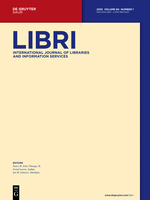
LIBRI-International Journal of Libraries and Information Studies
Elevating Academic Discourse in Library StudiesLIBRI - International Journal of Libraries and Information Studies, with ISSN 0024-2667 and E-ISSN 1865-8423, is a premier academic publication in the field of library and information science. Published by the esteemed Walter de Gruyter GmbH in Berlin, Germany, this journal has carved a distinguished place in academic discourse, earning a Q2 ranking in 2023 within its category, which underscores its impact and relevance to the community. With a comprehensive history spanning from 1950 and ongoing coverage until 2024, LIBRI provides a platform for rigorous research and innovative studies that advance the understanding of libraries and information systems globally. Researchers, professionals, and students are invited to engage with its diverse articles that cover a plethora of topics relevant to today’s information landscape. Although not an open-access journal, its contributions are valuable for those seeking to enhance their knowledge and stay updated in a rapidly evolving field.
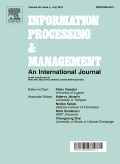
INFORMATION PROCESSING & MANAGEMENT
Transforming Research into Effective Information SolutionsINFORMATION PROCESSING & MANAGEMENT, published by ELSEVIER SCI LTD, is a distinguished journal at the forefront of research in the fields of Computer Science, Information Systems, Library and Information Sciences, and Management Science and Operations Research. Since its inception in 1975, this journal has continually evolved to provide a scholarly platform for the dissemination of innovative methodologies and frameworks in information processing. With a remarkable Q1 ranking across multiple disciplines and esteemed Scopus rankings—notably, 1st in Media Technology and 4th in Library and Information Sciences—it stands as a pivotal resource for researchers, professionals, and students alike, seeking to advance their understanding and application of information management principles. Although not an Open Access journal, it remains widely accessed and respected, marking its influence in shaping the future of effective information management practices. The journal is committed to providing a rigorous peer-review process, ensuring the publication of high-quality research that addresses current challenges and trends in information technology and its application in various sectors.